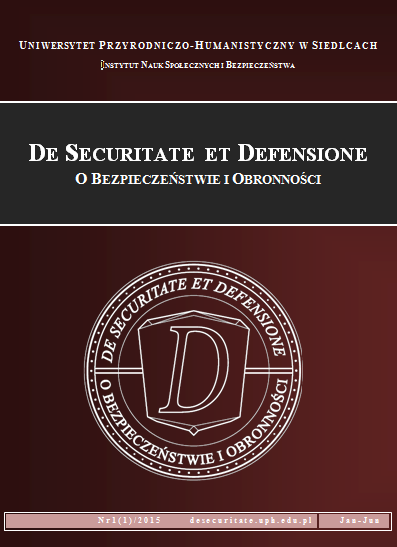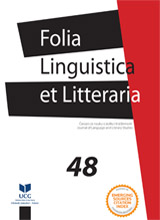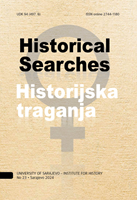Author(s): Merima Omeragić / Language(s): Bosnian
Issue: 48/2024
My scientific research on the beginnings of the Yugoslavian Romani women's movement is based on the idea of connection between these two areas, often viewed as mutually exclusive. Therefore, my research is based on a carefully constructed theoretical framework, which includes transnational and decolonial feminist perspectives. Taking into consideration the fact that Romani literature and culture are dismissed due to the systemic production of discrimination and racism, I have dedicated myself to the task of deconstructing the universalization of the stereotypes that delve into romanticization and dollarization or absolute dread of otherness. Within the existing order, the formal systems dispute the minority cultures, and thereby, as Maria Dalbello (1989) claims, the stereotypes about the Romani become metaphors for themselves. The minority cultures are determined by the attitude that, as Françoise Vergès (2023) points out, their authors, male and female, are lower beings without common sense, aesthetics, or abilities, which is mainly reflected in the double otherness of the Romani woman and her work, created within the framework of the dominant knowledge and culture, as well as under the conditions of a difficult tradition of her own community. Since Romani women are perceived as a disturbance to the norm, these women are robbed of their value, and their works are disregarded and rejected. The results of cultural exclusion need to be disputed by transnational and decolonial feminist knowledge focused on the fight against the dominant system, which “dismisses scientific knowledge, aesthetics and entire categories of human beings” (Vergès, 2023: 26). To fight this ultimateness, it is necessary to reach for a closer investigation of the context, as well as the representation of the praxes of the Romani women writers. Along with reading about Romani women’s culture through the lens of decolonial feminism, I have established a transnational connection between South Slavic and Romani women’s literature and culture. On another level, that context is best studied compared to the innovative translation philosophy established by Rada Iveković (2022). The translation policies are focused on the resistance to unambiguous systems of knowledge in a way that creates an alternative history that disturbs this knowledge and thereby introduces a metamorphosis of the texts in the act of interpretation. The emphasis is on the negotiation of the positions, the fight against discrimination, and the elimination of cultural racism. The process of transnational translation relativizes the notions of the center and the margin, thereby opening the door to a mutual literary and cultural impact, as well as the recontextualization “within the other (albeit related), culture and language, in this or that form” (Iveković 2022: 303). Therefore, the idea is to open the door from the dominant to the minority cultures. Connecting the spaces of the discourses themselves, I shall identify and question inequality through history, pointing to the “epistemological violence” (Spivak 2011: 99). The result of this action is mirrored in the dismantling and disturbing of the discrimination contained within the very essence of heteropatriarchal nationalism, which results in the inclusion of Romani women’s culture and literature. This research exercise and the interpretation of the specific aspects of the Romani women’s culture and literature is performed by questioning the possibilities for the newly created and released context. Connecting the discovered continent of Romani women’s literature and culture with engagement, I aim to point my research towards articulating an apparent literary and cultural movement. This research aims to reconstruct the beginnings of the Romani women’s literary and cultural movement. At the same time, I am dealing with the challenge of the unambiguous national corpora by opening those places for understanding different contents. One of the tasks is to describe the context and perspective of women’s lives described in and encompassed by these fields through a thorough shakeup of the cultural dogmas, the destruction of false universal truths, and Eurocentric epistemology. On the other hand, my focus is also on creating a map of works written by the first researchers of Romani women’s literature and culture, through which I will encompass some of the primary motifs of the artistic expression of our Romani women writers. The object and aims of my research are defined by the task of reconstructing the Romani women’s literature within a Yugoslavian context and the suppression of the continued erasure of the Other, as I choose to use decolonial feminist theory. In the chapter Decolonization: the Romani Sister, not Outsider (Dekoloniziranje: Romkinja sestra, a ne autsajderka) I perform an intersectional reading (connected to the women’s race, class, gender, nation, and sexuality) of the position of the Romani woman and their role and engagement in the creation of their own literature and culture. To that end, I refer to my point of view as a female researcher, which determines the aims of translating that culture, examining intercultural connections, and rewriting it in transnational fields. Generating my position, I consider Gayatri Chakravorty Spivak’s thesis (2011), which problematizes the opposing discourses and subjects of the marginalized and the privileged. While establishing the communication between these two options, I will tear down the labels of Romani women as outsiders “whose experience and traditions are too ‘foreign’ to make their understanding possible” (Lord 2022: 104). My role as a researcher is defined by the need for “allyship” due to the ambition to deconstruct the dominant narratives by broadening the knowledge and acknowledging the speech, affirming the Romani women’s literature and culture. My allyship activities, stemming from my humanist engagement, exist to contribute to the dismantling of the racialized order and, consequently, suppress separation. Denying the differences comes through the almost normalized “rejection to question false assumptions which result from the wrongful naming of the differences and their influence on human behavior and expectations” (Lord 2002: 102). At the same time, I aim to avoid the traps of civilizational discourse on liberation but also the mimicking of the discourse based on the mere exploitation of women. Through a scientific intervention, I will consider the history of racialized women and their work on reviving and affirming their culture. A characteristic of the Romani women writers’ works is their writing of how they dismantle the stereotypes about them, the stigmatization, marginalization, and discrimination that interweave through their experiences, creating a basis for the creation of the viewpoint and the motif in writing. That results in a significant challenge and a disturbing of the established orders. The theory I am applying in my research is based on the materialization of identity (the previously mentioned stratification of gender roles) between the epistemic underprivileged and the experience of repression and the systemic oppression of Romani women. If the woman writer determines the character of the narrative, to paraphrase Chandra Talpade Mohanty, then the marginalization that breeds art imposes itself as the key to the reading. Governed by the assumptions about the value of Others’ knowledge and the previously discussed allyship, the research will analyze the idea of translation between the South Slavic and Romani women’s literature and culture. Having defined the conditions of the research and answered the questions of why we translate cultures and what the role of the female researcher is, the next question I pose is—how to translate cultures? Translation is the “process of an asylum, and it means reciprocity” (Iveković 2022: 155) between the elements and the circumstances of the process, which reflect inequality. In the state of complex translatability or untranslatability, there is a communication gap between the marginalized Romani women’s culture and the dominant South Slavic national cultures. Hedina Tahirović- Sijerčić (2016), an influential scholar in Romani studies, calls that gap cultural racism which determines the reception of the Romani, especially in terms of Romani women’s literature and culture. Using translation, we can successfully draw attention to the need to dismantle the negation of otherness and aim to suppress the erasure of all traces of the Other and different subjects. On the other hand, the translation process follows the descriptions of the fields of Romani women’s literature, which is written in the broader scope of the South Slavic literary field. While translating cultures, this research is an exercise in the conscious speech of justice, and it contributes to creating a space devoid of stereotypes in which the affirmation of Romani women’s voices as the important voices of a specific community and a specific society, is possible. Having created and described the research framework and laid out the theoretical construct, the next step represents the examination of the existing research in the field of Romani studies, specifically that of Romani women’s literature and culture. I reach towards the analysis and representation of the earlier research because contemporary literary theory, as practiced in the Yugoslavian centers, almost as a rule, excludes and marginalizes the knowledge of Romani women’s literature in our countries. That is how I introduce different modes of research, while, on the other hand, I evaluate the autoemancipative efforts of fellow female researchers from Romani communities. To that end, my efforts are dedicated to the representation and interpretation of the pioneering research of Hedina Tahirović-Sijerčić and Iskra Vuksanović. I complete this chapter by directing readers towards the works of those Romani and nonRomani female researchers that are previously unnoticed, such as the works of Dubravka Đurić, Simbi Husarić-Junuzović and Antonija Raguž. The information on Romani women writers is rare in general, as confirmed by few titles available through a Google search—Women Writers from Former Yugoslavia—Selected Romani Poetry Written by Women (Autorice sa prostora bivše Jugoslavije – izabrana romska poezija koju pišu žene) (an anthology based on TahirovićSijerčić's research) or the existence of the thematic edition of Phralipen “Literature is Female” („Književnost je ženskog roda“), dedicated to Romani women writers and activists. The first challenge to interpreting the position of Romani woman in the fields of culture and women’s literature was tackled by Hedina Tahirović-Sijerčić. The author, recognizable by her interests in a broad field of different types of social research, made Romani women’s literature more available and more visible in her study Gender Identities in the Romani Women Writers’ Literature in Former Yugoslavia (Rodni identiteti u književnosti romskih autorica na prostorima bivše Jugoslavije) (2016). Her effort to make these works more available and visible included the translation level from Romani into Serbian/Montenegrin. Tahirović-Sijerčić based her research on postcolonial theory, with its insight into cultural differences, and the creation of a new identity of Romani women writers. Determined by the struggle to be free from patriarchal tradition and racial stigma, the identity of Romani women writers is written into the texts through the symbols of the Romani tradition: the motifs of escape, road and departure, superstitions, the lack of belonging, the sorrow of the Romani people, and woman’s difficult intimate emotions, from the relationship with paterocentric men to the pressures of the tradition. In terms of the creation of a new field, Tahirović-Sijerčić turns towards a gynocritical reconstruction of male literature—being both female and Romani, building the road from the first Romani female poet Gine Ranjičić (as a foremother in creativity) to the literary efforts of the contemporary women writers. Contextualizing gender and the experience of subordination as well as the exploitation based on race and class, the researcher analyzed the processes through which Romani women become subjects of their works. TahirovićSijerčić builds a corpus made of poetry and prose produced by Akila Eminova (Macedonia), Desanka Ristić Ranđelović, Maja Familić and Gordana Đurić (Serbia), Izeta Sejdović (Montenegro) and Amela Avdić (Bosnia and Herzegovina). In her doctoral thesis Anticolonialism and Gender: the Analysis of the Works of the Romani Women Writers Gordana Đurić, Desanka Ranđelović, Jelena Savić and Hedina Tahirović Sijerčić (Antikolonijalizam i rod: analiza dela romskih književnica Gordane Đurić, Desanke Ranđelović, Jelene Savić i Hedine Tahirović Sijerčić) (2022) Iskra Vuksanović tests the postcolonial theory using the knowledge of discursive practices and epistemological dogmas of otherness where our Romani women are in question. Starting with the reinterpretation of Gina Ranjičić’s inheritance, the researcher identifies the importance of works created by the female writers from the title of her thesis. In the last chapter of my research, I sketch out the future research that would further broaden our understanding of Romani women's literature through the works of new women writers who have not been included in the study so far. Along with the affirmation of Romani women's literature, as well as the South Slavic cultures, new research could oppose the domination of the monopoly in knowledge of the existing big cultures. To that end, I point out the main contours of the work by female writers Dragica Kladeraš, Zvezdana Lazić, Sandra S., Ferida Jašarević, Danijela Živković, Dušica Stupar, and Maja Jovanović, but also the authors from the anthology Romanipe – from the Shadow towards the Light (Romanipe – iz sjene na svjetlo) (2021) by Maja Grubišić, Selma Pezerović, Miridita Saliu, Vedrana Šajn and Nataša Tasić-Knežević. My sketch includes the Slovenian Romani women writers Jelenka Kovačić, Mladenka Šarkezi, Marina Breza, and Madalina Breza, as well as Jasmina Ahmetaj and Marta Gregorčič. In this research, I have opened the previously closed spaces of cultures for the contact of two fields and deconstructed the ideas of the centre and the margin in classical interpretations and narratives. The research, observed in its entirety, was created with the belief in and dedication to identifying and encouraging the starting point and enthusiasm for developing the Yugoslavian Romani women's literary and cultural field.
More...







